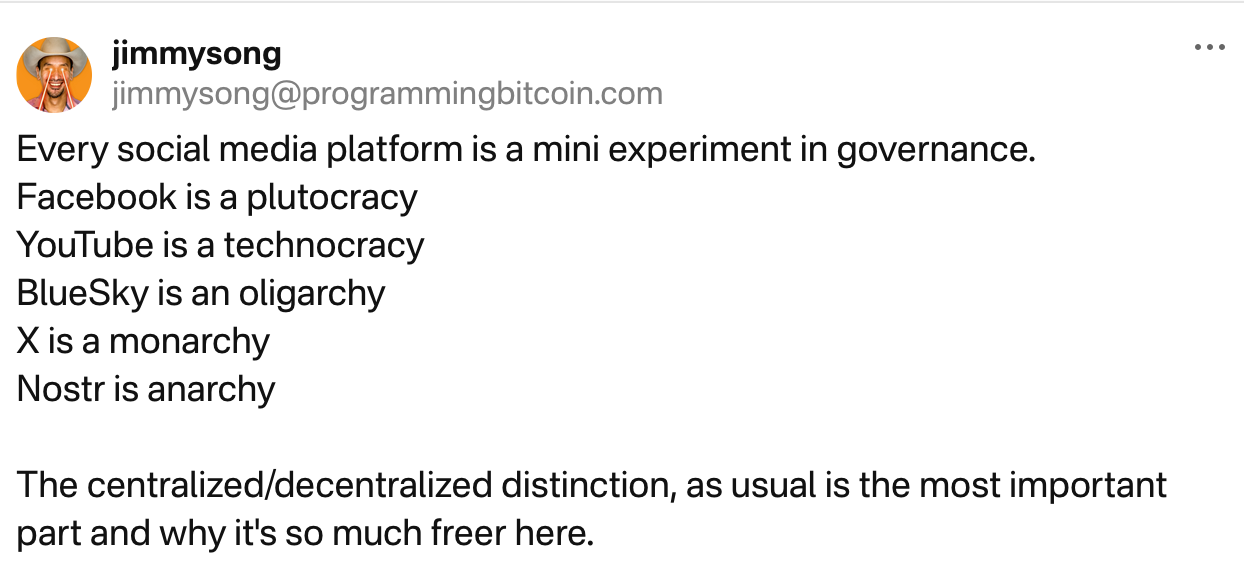Bitcoin Tech Talk #427
Interesting Stuff
Culture and Politics - “Politics is downstream of culture.” So said Steve Bannon and it’s at this point pretty much heeded as gospel in a lot of circles. But as this article points out, that is certainly not the case and conservatives wrongly attributed the success of the gay rights movement to movies like Brokeback Mountain when in fact, the movie itself was a lagging indicator of where the culture was at the time. As Hollywood has shown the last few years, they’re not very good at moving the Overton Window and indeed, they’ve been ridiculed mercilessly for their attempts to do so. A lot of Bitcoiners worry about popular portrayals of Bitcoin, but I think that worry is misplaced. Bitcoin in movies and shows will be a lagging indicator of where the culture is at.
Maternal Detachment - This is one of those articles that seems so obvious in retrospect, but not obvious when we’re looking at the situation separately. The main contention is that mothers should be very attached to their children, but in modern society, we’ve become accustomed to mothers doing the opposite and thinking it a virtue. As the conclusion says, expecting mothers to not mother is a sick society. Surely, this is one of the biggest reasons for the current fertility crisis as somehow motherhood has been debased.
Confessions of a Therapy Student - At this point, most people are skeptical of the benefits of DEI and wokeness in general, if not outright hostile and this article is part of that genre of wokeness ruining things. Specifically this is a student learning to become a therapist and finding that the requirements of being woke are crowding out actual learning. What was surprising to me was the section on how the DEI agenda has essentially allowed professors to be unbelievably lazy, showing youtube videos for most of their classes and grading on how woke the essays were. I’ve been under the impression that wokeness in general was motivated by wrong, but sincere beliefs, but I’m beginning to think that it’s more about laziness and entrenching rent-seeking instead.
Einstein and Special Relativity - The article all but calls Einstein a fraud, and indeed it brings the receipts. The famous equation for which he’s known, E=mc2 had multiple predecessors including De Pretto who proposed the same equation in 1903, none of whom were cited in Einstein’s paper in 1905. There’s even speculation that it was his wife, Mileva Maric that did all the difficult math. The impression we have of him in other words, may not be based on fact, but on mythology. As we say in Bitcoin, kill your heroes.
What I'm up to
Thoughts on the Ver Interview - I wrote a short essay on the interview Roger Ver had with Tucker Carlson. The guy is unfairly being targeted, and doesn’t deserve the book that they’re trying to throw at him, but the interview is rife with falsehoods and innuendos that are at best half-truths. Years of attacking Bitcoin with lies, propaganda and bitcoin.com has made me less than sympathetic to his plight.
Debate from 6 years ago - This was my debate with Roger 6 years ago on the CoinsBank cruise. That trip itself probably deserves a blog post as it was by far the weirdest conference I’ve been to. I think my points have aged well, and his attacks have more or less been what he’s been doing for the last 6 years.
Quantum stuff - Yea, Google, quantum progress, yadda yadda yadda. Honestly, it’s pretty tiring hearing people question Bitcoin’s viability because of quantum. I keep telling people that quantum computing is as big a scam as climate change, and the paper I linked is why.
Nostr Note of the Week
What I’m Promoting
Bitcoin
Covenants Desirability - James O’Beirne writes on the pros and cons from his perspective of the many different covenant proposals that are in existence. His main desire seems to be to enable some sort of vaults to make self-custody more robust, though that’s not by any means the only consideration. It’s a bit crazy how big the space of possible proposals are, and yet the proposed changes still aren’t getting developers excited or users to understand what it means for them.
UASF CTV - Nothing more than rumors at this point, but worth pondering. According to Cobra, there’s a group of devs outside of Core that are planning some sort of user-activated soft fork of OP_CTV. This would definitely be an interesting thing to watch and we’ll see how the miners break and how big companies will line up if true. Given the contentiousness of soft forks these days, something like this is bound to happen even if it’s not specifically CTV. There’s a lot of game theory to think about and I look forward to seeing how it all plays out.
Wasabi CoinJoin Vulnerability - There was a vulnerability by which a Wasabi coordinator could de-anonymize the coinjoins of the participants. The main way to do that is by tagging different users with a different maximum allowed in the coinjoin. At least looking at how Coinjoin coordinators behave currently, it does seem that this vulnerability hasn’t been exploited, but it does give some reason to be a bit concerned about coordinated coinjoins in general.
Lightning
Irrevocable Fees Vulnerability - David Harding wrote in Delving Bitcoin about a way in which a channel participant can screw the other endpoint by mining a transaction that pays most of the UTXO value to fees. This would mean the miner would get most of the value of the channel UTXO and not the aggrieved party. The vulnerability was disclosed responsibly about a year ago and has since been patched in the three clients that had them.
Channel Depletion - Another really interesting discussion on Delving, this time by Rene Pickhardt on Lightning Network topology. Essentially, whatever cycles exist in the graph get depleted over time even when there aren’t obvious sink nodes (only receive) or source nodes (only spend). The eventual state of any Lightning Network graph is some sort of tree topology, or one without cycles as these cycles deplete. This suggests that routing requires some amount of new channels to open even in an optimally performing network.
Transaction Relay Jamming - This is a vulnerability where nodes can be flooded with junk transactions to jam the processing capacity. For lightning transactions in particular, an attacker could potentially seize funds in channels they’re a part of, but more likely it would be used to degrade the lightning network settlement transactions’ ability to get into the main chain.
Economics, Engineering, Etc.
21,550 BTC - Another week, another bounty for MSTR. They used to do this sort of thing once a quarter, but given how much money is available using ATM stock sales and convertible bonds, the spigot is open. As a result of these activities, their market cap is high enough to be included in the QQQ (Nasdaq 100) index. RIOT has also announced a $500M convertible bond, had it oversubscribed and bought Bitcoin with it, all in a week. Shareholders even put Amazon and Microsoft buying Bitcoin for their balance sheet to a vote! The Bitcoin purchases by corporations is accelerating.
Debunking Operation Chokepoint 2.0 - Nic Carter has written a lot about the supposed government scheme to destroy crypto-friendly banks, but as this rather long blog post shows, the bankruptcies were not the result of government targeting. Rather, it was the bankruptcy of FTX and other crypto scams that ultimately made the bank balance sheets so bad that the banks simply didn’t meet the standards required of them to stay in business. Now, much of the time, similar banks will get a bailout, but surely, this is not the same thing as something like the original Operation Chokepoint which directly targeted businesses the Obama administration didn’t like? The “crypto” companies, in other words, caused the collapse of these banks.
Re-denominating Bitcoin - John Carvalho has submitted a BIP to rename sats to Bitcoin, the idea being that this would allow less unit bias as people would stop thinking of Bitcoin as so expensive now that a sat is worth about $0.001. I understand why he wants to do it, but this is just asking for trouble. Many hyperinflating countries have had to deal with the same phenomenon, just in the other direction, where they want to take off zeros at the end of their currency. Unfortunately, there are too many systems that rely on the old definition and even with centralized control, such changes are really painful with mistakes all around. Though I’m the author of BIP176 (bits), I’ve come to realize that this isn’t going to happen without some groundswell of independent support. Such is how decentralized systems work.
Quick Hits
Change the Code Ends - The Greenpeace initiative funded by Ripple has mercifully come to an end.
Vancouver to be Bitcoin friendly? - A motion calling for integration of Bitcoin into Vancouver’s financial strategies passed.
El Salvador IMF Loan - El Salvador is getting a $1.3B loan from the IMF and in return, they have agreed to no longer make BTC legal tender.
Strike Allowing USDT - Tether is now part of the Strike app in certain countries.
Fiat delenda est.







